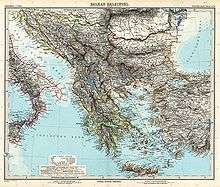Istanbul University
Istanbul University (Turkish: İstanbul Üniversitesi) is a prominent Turkish university located in Istanbul. The main campus is adjacent to Beyazıt Square in Fatih, the capital district of the province, on the European side of the city. Some pre-1923/1930 western sources refer to it as the University of Constantinople, after the previous name of the city.[1]
İstanbul Üniversitesi | |
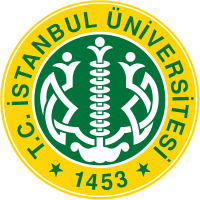 | |
| Latin: Universitas Constantinopolitanum | |
| Motto | "Leadership in Higher Education for Centuries" |
|---|---|
| Type | Public University |
| Established | 1453 (reformed 1846/1933) |
| Rector | Mahmut Ak |
Administrative staff | 6,000 |
| Undergraduates | 86,092 |
| Postgraduates | 12,000 |
| Location | , 41°00′46.93″N 28°57′49.95″E |
| Campus | Beyazıt Campus Vezneciler Campus Avcılar Campus Çapa Campus Kadıköy Campus |
| Founder | Mehmed II (1453) Abdülmecid I (1846) Abdülaziz I (1870) Abdülhamid II (1900) Mehmed V (1912) M. K. Atatürk (1933) |
| Colors | Green Yellow |
| Affiliations | Coimbra Group EUA UNIMED |
| Website | www |
Istanbul University is associated with 2 Nobel laureates, Aziz Sancar (in Chemistry) and Orhan Pamuk (in Literature).[2][3]
History
It was founded as an institution of higher education named the Darülfünun (دار الفنون) (House of Multiple Sciences) on 23 July 1846; but the Medrese (Islamic theological school) which was founded immediately after Mehmed II conquered Constantinople (Istanbul) in 1453 is regarded as the precursor to the Darülfünûn which evolved into Istanbul University in 1933.[4] Education in a number of sciences and fields (such as medicine, mathematics, astronomy, cartography, geography, history, philosophy, religion, literature, philology, law, etc.) became available, and, until the 19th century, they were instrumental in educating the ruling cadres of the Ottoman society. However, when the medreses were no longer able to meet the needs of the modern world, a restructuring process began, and as a result, the institutions of higher education called Darülfünûn, the core of Istanbul University, was established.
An institution of higher education named the Darülfünûn-u Osmanî (دار الفنون عثماني) (Ottoman House of Sciences) was created in 1863, but suppressed in 1871.[4] Its first rector was Hasan Tahsini, regarded as one of the most important Ottoman scholars of the 19th century. In 1874 the Imperial University (Darülfünûn-u Sultanî) (دار الفنون سلطاني) started classes in law in French, but was closed in 1881.[4]
The Imperial University, now known as Darülfünûn-u Şahâne (دار الفنون شهانه) was refounded in 1900, with the departments of theology, arts, mathematics, science and philology.[4] In 1924, the faculties of law, medicine, arts and sciences were established in Istanbul University (İstanbul Darülfünûnu), as the university was now called.[4] Islamic theology was added in 1925, but in 1933 the university was reorganized without the latter.[4]
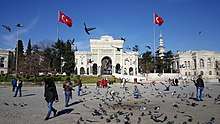
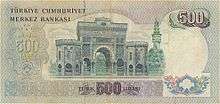
| University rankings | |
|---|---|
| Global – Overall | |
| ARWU World[5] | 401-500 |
| CWTS World[6] | 334 |
| RUR World[7] | 529 |
| THE World[8] | 801-1000 |
| USNWR Global[9] | 663 |
| QS World[10] | 801-1000 |
The first modern Applied Physics courses were given at the Darülfünûn on 31 December 1863, which marked the beginning of a new period, and on 20 February 1870, the school was renamed as the Darülfünûn-u Osmanî (Ottoman House of Multiple Sciences) and reorganized to meet the needs of modern sciences and technologies. Starting from 1874, some classes of Literature, Law and Applied Sciences were given at the building of Galatasaray High School, which continued regularly until 1881. On 1 September 1900, the school was renamed and reorganized as the Darülfünûn-u Şahâne (Imperial House of Multiple Sciences) with courses on Mathematics, Literature and Theology. On 20 April 1912, the school was renamed as the İstanbul Darülfünûnu (Istanbul House of Multiple Sciences) while the number of courses were increased and the curricula were modernized with the establishment of the Schools of Medicine, Law, Applied Sciences (Physics, Chemistry, Mathematics), Literature and Theology.
On 21 April 1924, the Republic of Turkey recognized the İstanbul Darülfünûnu as a state school, and on 7 October 1925, the administrative autonomy of İstanbul Darülfünûnu was recognized while the Schools (within the old Medrese system) became modern Faculties.
On 1 August 1933, İstanbul Darülfünûnu was reorganized as İstanbul Üniversitesi (Istanbul University) following the educational reforms of Mustafa Kemal Atatürk. Classes officially began on 1 November 1933.
Campus
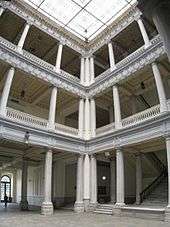
The university has seventeen faculties on five campuses; the main campus being on Beyazıt Square, which was originally built by Constantine the Great as the Forum Tauri and was later enlarged by Theodosius the Great as the Forum of Theodosius during the Roman period.
The main campus building with its landmark gate was previously used as the headquarters of the Harbiye Nezareti (Ministry of War) by the Ottoman government. Located on the grounds is the Beyazıt Tower, an 85 m (279 ft) tall fire-watch tower. The grounds were previously the location of the Ottoman era Eski Saray (Old Palace). Some Roman and Byzantine ruins are still visible on the grounds.
The university has a teaching staff of 2,000 professors and associates and 4,000 assistants and younger staff. More than 60,000 undergraduate and 8,000 postgraduate students follow the courses offered by Istanbul University every year.
The main gate was depicted on the reverse of the Turkish 500 lira banknotes of 1971–1984.[11]
International perspective and rankings
Istanbul University School of Business is the only AACSB-Accredited Business School among the public universities in Turkey.[12]
In the Academic Ranking of World Universities 2019, Istanbul University is ranked at 401-500th worldwide (1st in Turkey). It is also ranked at 251-300th in "Veterinary Sciences", 401-500th in "Clinical Medicine", 101-150th in "Dentistry & Oral Sciences", 201-300th in "Nursing" and 301-400th in "Medical Technology".[13][14][15][16][17][18]
In 2020, Times Higher Education ranked the university top 1000 in the world, and 401-500th in "Clinical, pre-clinical and health", 401-500th in "Education" and 501-600th in "Social Sciences".[19]
In the QS World University Rankings 2020, Istanbul University is ranked at 801-1000th globally. In the broad subject areas, it is ranked 342nd in "Life Sciences and Medicine" and 451-500th in "Arts and Humanities". In the subject areas, it is ranked at 201-250th in "Modern Languages", 301-350th in "Agriculture & Forestry", 301-350th in "Medicine" and 401-450th in "Biological Sciences".[20]
The Best Global Universities Ranking 2019 of the U.S. News & World Report ranks Istanbul University 706th in the world, 225th in "Surgery", 239th in "Clinical Medicine", 244th in "Neuroscience and Behavior", 383rd in "Molecular Biology and Genetics", 436th in "Plant and Animal Science", 481st in "Biology and Biochemistry" and 619th in "Physics".[21]
By CWTS Leiden Ranking 2019, Istanbul University is ranked 335th (overall), 196th in "Biomedical and Health Sciences", 374th in "Life and Earth Sciences", 669th in "Mathematics and Computer Science", 544th in "Physical Sciences and Engineering" and 570th in "Social Sciences and Humanities".[22]
By Round University Ranking 2019, Istanbul University is ranked 529th in the world, 490th in "Humanities", 496th in "Life Sciences", 329th in "Medical Sciences", 556th in "Natural Sciences", 506th in "Social Sciences" and 600th in "Technical Sciences".[23][24]
Notable faculty
Please see the page Istanbul University faculty.
Notable alumni
See also Istanbul University alumni for a detailed list.
- Turkish Presidents
- Foreign Presidents
- Yitzhak Ben-Zvi, President of Israel
- David Ben-Gurion, Prime Minister of Israel
- Speakers of the Turkish parliament
- Turkish Prime Ministers
- Refik Saydam
- Yıldırım Akbulut
- Sadi Irmak
- Suad Hayri Ürgüplü
- Nihat Erim
- Foreign Prime Ministers
- David Ben-Gurion, Prime Minister of Israel
- Moshe Sharett, Prime Minister of Israel
- Turkish Ministers
- Politicians
- Ihsan Sabri Çağlayangil – Former Minister of Foreign Affairs
- Cemil Çiçek – Former Speaker of the Parliament
- Coşkun Kırca – Former Minister of Foreign Affairs
- Erkan Mumcu – Former Minister of Culture and Tourism / Minister of Education / Minister of Tourism
- Ali Tanrıyar – Former Minister of Interior
- Kadir Topbaş – Former Mayor of Istanbul
- Köksal Toptan – Former Speaker of the Parliament
- Hayati Yazıcı – Former Minister of Customs and Trade
- Nimet Bas – Former Minister of Education
- Naci Ağbal – Former Minister of Finance
- Murat Başesgioğlu – Former Minister of Labor and Social Security
- Ekrem İmamoğlu – Current Mayor of Istanbul
- Masud Sabri – Pharmacist and former Governor of Xinjiang province in China
- Meral Akşener - Leader of İYİ Party
- Journalists
- Scientists
- Writers
- Nihal Atsiz
- Ali Kurumahmut
- Orhan Pamuk, Nobel Laureate in Literature
- İlhan Selçuk[25]
- Ahmet Hamdi Tanpinar
- Bahadir Kaleagasi, international co-ordinator of TUSIAD
- Reşat Nuri Güntekin
- Duygu Asena
- Mario Levi
- Mıgırdiç Margosyan
- Poets
- Orhan Veli
- Attila İlhan
- Onat Kutlar
- Musicians
- Other
- Özgür Çevik – Singer, Actor
- Cüneyt Arkın — Actor, Director
- Cansu Dere – Actress, Model
- Burcu Esmersoy[26] – Anchorwoman, Model
- Deniz Gezmiş – Political activist
- Özgü Namal – Actress, Singer
- Türkan Rado (1915-2007), first ever Turkish female professor of jurisprudence
- Çağatay Ulusoy – Actor
- Okan Yalabık – Actor
- Ekrem İmamoğlu – Mayor of Istanbul
- Tuncel Kurtiz – Actor
- Metin Erksan – Film Director and Art Historian
- Arif Mardin – Music Producer
Gallery
 Main Gate
Main Gate Faculty of Social Sciences
Faculty of Social Sciences Beyazit Campus
Beyazit Campus.jpg) Beyazit Campus
Beyazit Campus Beyazit Campus
Beyazit Campus- Faculty of Social Sciences
 Faculty of Political Sciences Gulhane Building
Faculty of Political Sciences Gulhane Building.jpg) Garden of Istanbul University - Süleymaniye Mosque at Rear
Garden of Istanbul University - Süleymaniye Mosque at Rear Süleymaniye Mosque - Istanbul University - Aerial view
Süleymaniye Mosque - Istanbul University - Aerial view Faculty of Science
Faculty of Science- Main Entrance and Beyazit Tower
 Courtyard of the Faculty of Social Sciences
Courtyard of the Faculty of Social Sciences Beyazit Tower in Main Campus
Beyazit Tower in Main Campus Mustafa Kemal Atatürk in Faculty of Law
Mustafa Kemal Atatürk in Faculty of Law- Beyazit Campus
See also
- Balkan Universities Network
- Famous Academicians and Persons of Istanbul University
- List of modern universities in Europe (1801–1945)
- Istanbul University Observatory
- Beyazıt Tower
- Education in the Ottoman Empire
- Dar ul-Funun (Persia)

References
- Journal of the American Medical Association, Volume 79. American Medical Association, 1922. p. 646
- "The Nobel Prize in Chemistry 2015". NobelPrize.org.
- "The Nobel Prize in Literature 2006". NobelPrize.org.
- Rüegg, Walter: "European Universities and Similar Institutions in Existence between 1812 and the End of 1944: A Chronological List", in: Rüegg, Walter (ed.): A History of the University in Europe. Vol. 3: Universities in the Nineteenth and Early Twentieth Centuries (1800–1945), Cambridge University Press, 2004, ISBN 978-0-521-36107-1, p. 687
- U.S. News Education: Best Global Universities 2018
- QS World University Rankings 2019
- Central Bank of the Republic of Turkey "Archived copy". Archived from the original on 3 June 2009. Retrieved 5 January 2008.CS1 maint: archived copy as title (link). Banknote Museum: 6. Emission Group – Five Hundred Turkish Lira – I. Series Archived 4 February 2009 at the Wayback Machine & II. Series Archived 4 February 2009 at the Wayback Machine. – Retrieved 20 April 2009.
- "Find AACSB-Accredited Business Schools | AACSB". www.aacsb.edu.
- "Istanbul University | Academic Ranking of World Universities - 2019 | Shanghai Ranking - 2019". www.shanghairanking.com.
- "ShanghaiRanking's Global Ranking of Academic Subjects 2019 - Veterinary Sciences | Shanghai Ranking - 2019". www.shanghairanking.com.
- "ShanghaiRanking's Global Ranking of Academic Subjects 2019 - Clinical Medicine | Shanghai Ranking - 2019". www.shanghairanking.com.
- "ShanghaiRanking's Global Ranking of Academic Subjects 2019 - Dentistry & Oral Sciences | Shanghai Ranking - 2019". www.shanghairanking.com.
- "ShanghaiRanking's Global Ranking of Academic Subjects 2019 - Nursing | Shanghai Ranking - 2019". www.shanghairanking.com.
- "ShanghaiRanking's Global Ranking of Academic Subjects 2019 - Medical Technology | Shanghai Ranking - 2019". www.shanghairanking.com.
- "Istanbul University". Times Higher Education (THE).
- "Istanbul University". Top Universities.
- "US News Best Global Universities".
- Studies (CWTS), Centre for Science and Technology. "CWTS Leiden Ranking". CWTS Leiden Ranking.
- "World University Rankings". roundranking.com.
- "Istanbul University". roundranking.com.
- "Turkish journalist İlhan Selçuk died". National Turk. 23 June 2008. Retrieved 6 July 2010.
- İpek, Bülent (1 January 2011). "O Artık Bir Magazin Figürü". HaberTürk. Istanbul. Archived from the original on 3 August 2014. Retrieved 10 August 2016.
External links
| Wikimedia Commons has media related to Istanbul University. |
- Istanbul University website (in Turkish and English)
- History of Istanbul University (Turkish)
